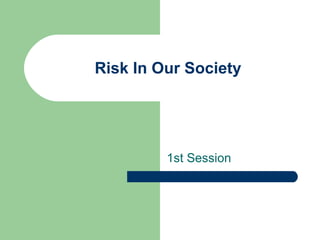Risk In Our Society
•Descargar como PPT, PDF•
4 recomendaciones•35,076 vistas
Denunciar
Compartir
Denunciar
Compartir

Más contenido relacionado
La actualidad más candente
La actualidad más candente (20)
Chapter 1 - Risk Management - 2nd Semester - M.Com - Bangalore University

Chapter 1 - Risk Management - 2nd Semester - M.Com - Bangalore University
Destacado
A comparative risk assessment of burden of disease and injury attributable to...

A comparative risk assessment of burden of disease and injury attributable to...Institute for Health Metrics and Evaluation - University of Washington
Destacado (20)
A comparative risk assessment of burden of disease and injury attributable to...

A comparative risk assessment of burden of disease and injury attributable to...
Similar a Risk In Our Society
Similar a Risk In Our Society (20)
RisK, RiSk MaNaGeMeNt & EnterPRise RisK ManaGemeNT

RisK, RiSk MaNaGeMeNt & EnterPRise RisK ManaGemeNT
Dr.U.Priya, Head & Assistant Professor of Commerce, Bon Secours for Women, Th...

Dr.U.Priya, Head & Assistant Professor of Commerce, Bon Secours for Women, Th...
Amity Campus Uttar Pradesh India 201303 ASSIGNMENTS PROGRAM MBA IB SEMESTER-III

Amity Campus Uttar Pradesh India 201303 ASSIGNMENTS PROGRAM MBA IB SEMESTER-III
Más de daryl10
Más de daryl10 (20)
Management and organisations 1 metropolia eba:em09 group autumn 2010

Management and organisations 1 metropolia eba:em09 group autumn 2010
Último
Último (20)
The Path to Product Excellence: Avoiding Common Pitfalls and Enhancing Commun...

The Path to Product Excellence: Avoiding Common Pitfalls and Enhancing Commun...
Call Girls In DLf Gurgaon ➥99902@11544 ( Best price)100% Genuine Escort In 24...

Call Girls In DLf Gurgaon ➥99902@11544 ( Best price)100% Genuine Escort In 24...
The Coffee Bean & Tea Leaf(CBTL), Business strategy case study

The Coffee Bean & Tea Leaf(CBTL), Business strategy case study
RSA Conference Exhibitor List 2024 - Exhibitors Data

RSA Conference Exhibitor List 2024 - Exhibitors Data
Creating Low-Code Loan Applications using the Trisotech Mortgage Feature Set

Creating Low-Code Loan Applications using the Trisotech Mortgage Feature Set
Regression analysis: Simple Linear Regression Multiple Linear Regression

Regression analysis: Simple Linear Regression Multiple Linear Regression
Grateful 7 speech thanking everyone that has helped.pdf

Grateful 7 speech thanking everyone that has helped.pdf
Call Girls In Panjim North Goa 9971646499 Genuine Service

Call Girls In Panjim North Goa 9971646499 Genuine Service
Call Girls In Holiday Inn Express Gurugram➥99902@11544 ( Best price)100% Genu...

Call Girls In Holiday Inn Express Gurugram➥99902@11544 ( Best price)100% Genu...
Value Proposition canvas- Customer needs and pains

Value Proposition canvas- Customer needs and pains
Lucknow 💋 Escorts in Lucknow - 450+ Call Girl Cash Payment 8923113531 Neha Th...

Lucknow 💋 Escorts in Lucknow - 450+ Call Girl Cash Payment 8923113531 Neha Th...
Call Girls Navi Mumbai Just Call 9907093804 Top Class Call Girl Service Avail...

Call Girls Navi Mumbai Just Call 9907093804 Top Class Call Girl Service Avail...
Yaroslav Rozhankivskyy: Три складові і три передумови максимальної продуктивн...

Yaroslav Rozhankivskyy: Три складові і три передумови максимальної продуктивн...
Risk In Our Society
- 1. Risk In Our Society 1st Session